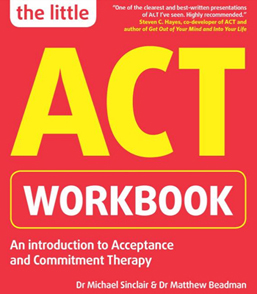What kind of therapy is it?
ACT (pronounced as one word: “Act”) is a behavioural therapy. It is part of the “third wave” of behavioural therapies - those that focus less on the content of your thoughts and feelings than on how you respond to them, and that often incorporate mindfulness.
What problems can it help with?
ACT aims to be helpful with any kind of problem.
How does it work?
ACT is focussed on behavioural change. It invites you to “get out of your head and into your life” – to stop struggling with your thoughts and feelings and instead focus on taking action to move towards the life you want. It can often feel like we are in a tug-of-war with our thoughts and feelings, constantly trying to get rid of bad ones and have more good ones. We find that we cannot win the tug-of-war, and meanwhile life is passing us by.
In ACT, you will learn to use mindfulness techniques to step back from your thoughts and feelings, let them be as they are, and connect with the present moment, so that you can re-engage with your life. You will work to clarify exactly what it is that you value in life, make plans to move in that direction, and then do so. Rather than waiting for your thoughts and feelings to be the way you want them before you can do the things you want to, ACT encourages you to start living the life that matters to you, today.
What will a typical session be like?
ACT is interactive and collaborative - your therapist will work with you as an equal. They will ask you to do experiential exercises in sessions, using your own direct experience as a guide to where change is necessary and possible. They will use metaphors and analogies to help you understand the principles of ACT and to build helpful psychological skills. They might ask you to fill in worksheets, and they will ask you to practice in between sessions the techniques that you have learned in them. Once you are ready, they will start asking you to actually do things differently in your life.
What is the evidence?
More than 200 scientific studies have been conducted on ACT, and the American Psychological Society says that there is evidence that it works for depression, anxiety, chronic pain, OCD, and psychosis. That does not mean that it only works for those conditions - just that these are the conditions for which the largest amount of evidence has been amassed.
Further reading: Contextual Science
The Little ACT Workbook: An Introduction to Acceptance and Commitment Therapy: a mindfulness- based guide for leading a full and meaningful life Paperback by Dr. Michael Sinclair

The Little Depression Workbook: Build the life you want with mindfulness, compassion and meaningful action - Paperback by by Dr. Michael Sinclair